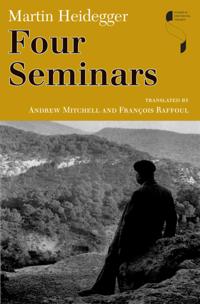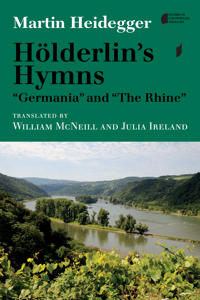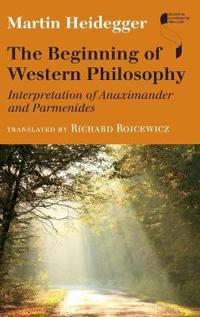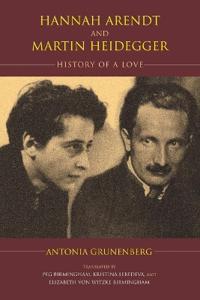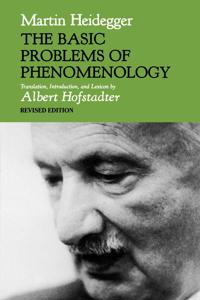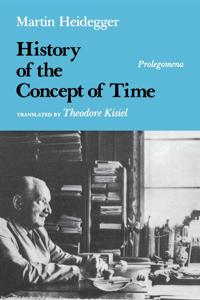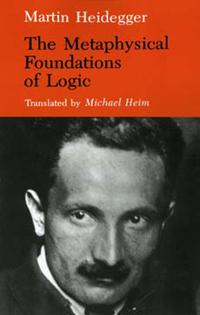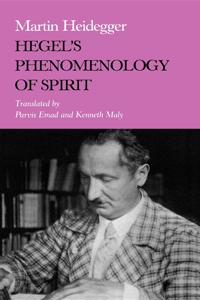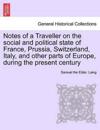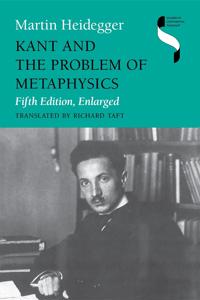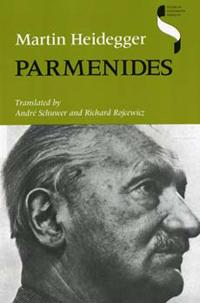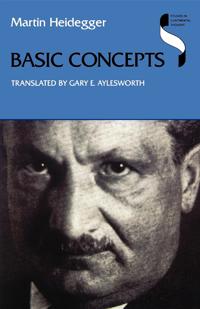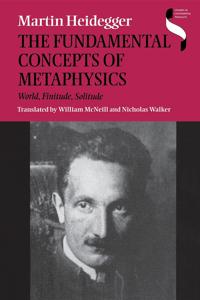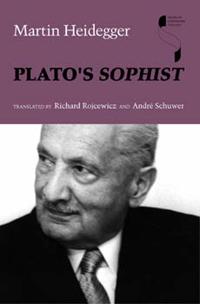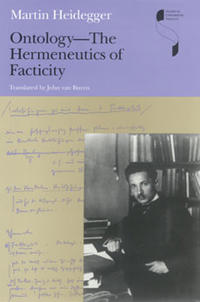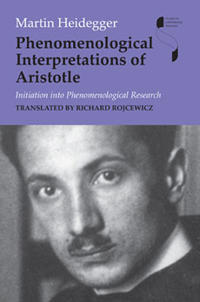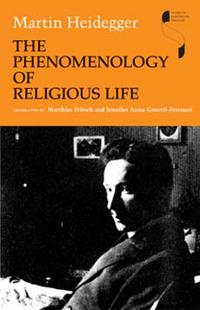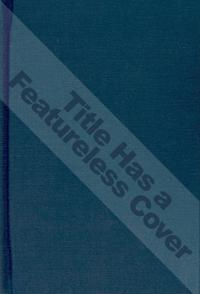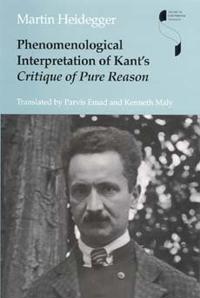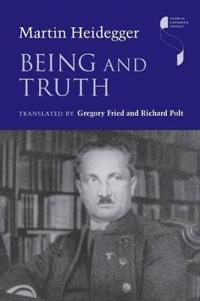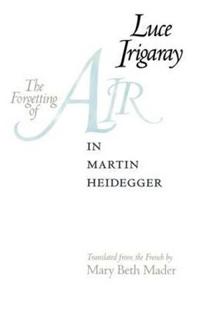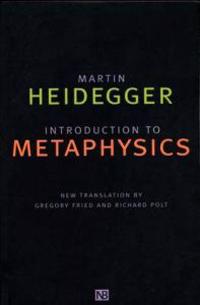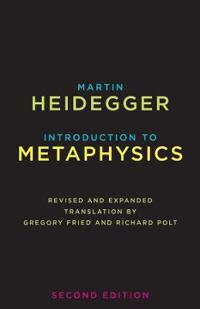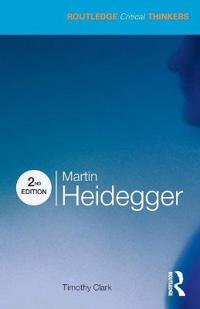Four Seminars (Häftad)
avMartin Heidegger
ISBN: 9780253008817 - UTGIVEN: 201206In Four Seminars, Heidegger reviews the entire trajectory of his thought and offers unique perspectives and comments upon fundamental aspects of his work. First published in French in 1976, these seminars were translated into German with Heidegger's approval and reissued in 1986 as part of his Gesa[...]
Holderlin's Hymns "Germania" and "The Rhine" (Inbunden)
avMartin Heidegger
ISBN: 9780253014214 - UTGIVEN: 2014-10Martin Heidegger's 1934-1935 lectures on Friedrich Holderlin's hymns "Germania" and "The Rhine" are considered the most significant among Heidegger's lectures on Holderlin. Coming at a crucial time in his career, the text illustrates Heidegger's turn toward language, art, and poetry while reflecting[...]
The Beginning of Western Philosophy (Inbunden)
avMartin Heidegger
ISBN: 9780253015532 - UTGIVEN: 2015-02Volume 35 of Heidegger s Complete Works comprises a lecture course given at the University of Freiburg in 1932, five years after the publication of Being and Time. During this period, Heidegger was at the height of his creative powers, which are on full display in this clear and imaginative text. In[...]
Hannah Arendt and Martin Heidegger (häftad)
ISBN: 9780253025371 - UTGIVEN: 2017-07How could Hannah Arendt, a German Jew who fled Germany in 1931, have reconciled with Martin Heidegger, whom she knew had joined and actively participated in the Nazi Party? In this remarkable biography, Antonia Grunenberg tells how the relationship between Arendt and Heidegger embraced both love and[...]
The Basic Problems of Phenomenology (Häftad)
avMartin Heidegger
ISBN: 9780253204783 - UTGIVEN: 198206A lecture course that Martin Heidegger gave in 1927, The Basic Problems of Phenomenology continues and extends explorations begun in Being and Time. In this text, Heidegger provides the general outline of his thinking about the fundamental problems of philosophy, which he treats by means of phenomen[...]
A History of the Concept of Time (Häftad)
avMartin Heidegger
ISBN: 9780253207173 - UTGIVEN: 198506Heidegger's lecture course at the University of Marburg in the summer of 1925, an early version of Being and Time (1927), offers a unique glimpse into the motivations that prompted the writing of this great philosopher's master work and the presuppositions that gave shape to it. The book embarks upo[...]
The Metaphysical Foundations of Logic (Häftad)
avMartin Heidegger
ISBN: 9780253207647 - UTGIVEN: 1984-06Offering a full-scale study of the theory of reality hidden beneath modern logic, The Metaphysical Foundations of Logic, a lecture course given in 1928, illuminates the transitional phase in Heidegger's thought from the existential analysis of Being and Time to the overcoming of metaphysics in his l[...]
Hegel's "Phenomenology of Spirit" (Häftad)
avMartin Heidegger, Parvis Emad, Kenneth Maly
ISBN: 9780253209108 - UTGIVEN: 199406Available for the first time in English, this text of a 1930ETH1931 lecture course on the opening chapters of "Hegel's Phenomenology of Spirit" contains some of Heidegger's most crucial statements about temporality, ontological difference and dialectic, and being and time in Hegel. It is a key text [...]
The Principle of Reason (Häftad)
avMartin Heidegger
ISBN: 9780253210661 - UTGIVEN: 1996-06'Starting from Leibniz's principle of sufficient reason ..., Heidegger reflects on the relation of modern and ancient philosophy and of poetry and thinking...an accurate and readable English translation.' - "Choice". 'Recreates the intellectual footwork necessary for Heidegger's leap from the terra [...]
Kant and the Problem of Metaphysics (Häftad)
avMartin Heidegger
ISBN: 9780253210678 - UTGIVEN: 199706o ...one of HeideggerOs most important and extraordinary works...indispensable for anyone interested in HeideggerOs thought as well as in current trends in hermeneutics, ethics, and political philosophy.O NInterpretation oKant and the Problem of Metaphysics is among the most important readings in th[...]
Parmenides (Häftad)
avMartin Heidegger
ISBN: 9780253212146 - UTGIVEN: 199806...excellent translation ...--The Philosopher Parmenides, a lecture course delivered by Martin Heidegger at the University of Freiburg during the winter semester of 1942-1943, presents a highly original interpretation of ancient Greek philosophy. A Major contribution to Heidegger's provocative dialo[...]
Basic Concepts (Pocket)
avMartin Heidegger
ISBN: 9780253212153 - UTGIVEN: 1998-08o ...an excellent and accessible introduction to the later Heidegger.O NChoice oHeidegger's method is unmistakable in these lectures...This is thinking that is alive, always green.O NReview of Metaphysics oThis translation ...enlarges our historical view of the probing advances in Heidegger's thoug[...]
The Fundamental Concepts of Metaphysics (Häftad)
avMartin Heidegger
ISBN: 9780253214294 - UTGIVEN: 200105First published in German in 1938 as volume 29/30 of Heidegger's collected works, The Fundamental Concepts of Metaphysics includes an extended treatment of the history of metaphysics and an elaboration of a philosophy of life and nature. Heidegger's concepts of organism, animal behaviour, and envir[...]
Plato's Sophist (Häftad)
avMartin Heidegger
ISBN: 9780253216298 - UTGIVEN: 200310This volume reconstructs Martin Heidegger's lecture course at the University of Marburg in the winter semester of 1924-25, which was devoted to an interpretation of Plato and Aristotle. Published for the first time in German in 1992 as volume 19 of Heidegger's Collected Works, it is a major text not[...]
Ontology -The Hermeneutics of Facticity (Häftad)
avMartin Heidegger
ISBN: 9780253220219 - UTGIVEN: 2008-12First published in 1988 as volume 63 of his Collected Works, "Ontology - The Hermeneutics of Facticity" is the text of Heidegger's lecture course at the University of Freiburg during the summer of 1923. In these lectures, Heidegger reviews and makes critical appropriations of the hermeneutic traditi[...]
Phenomenological Interpretations of Aristotle (Häftad)
avMartin Heidegger
ISBN: 9780253221155 - UTGIVEN: 200906Phenomenological Interpretations of Aristotle, the text of a lecture course presented at the University of Freiburg in the winter of 1921-22, was first published in 1985 as volume 61 of Heidegger's collected works. Preceding Being and Time, the work shows Heidegger introducing novel vocabulary as he[...]
The Phenomenology of Religious Life (Häftad)
avMartin Heidegger
ISBN: 9780253221896 - UTGIVEN: 201003The Phenomenology of Religious Life presents the text of Heidegger's important 1920-21 lectures on religion. The volume consists of the famous lecture course Introduction to the Phenomenology of Religion, a course on Augustine and Neoplatonism, and notes for a course on The Philosophical Foundations[...]
Holderlin's Hymn The "Ister" (Inbunden)
avMartin Heidegger
ISBN: 9780253330642 - UTGIVEN: 199606Martin Heidegger's 1942 lecture course interprets Friedrich Holderlin's hymn "The Ister" within the context of Holderlin's poetic and philosophical work, with particular emphasis on Holderlin's dialogue with Greek tragedy. Revealing of Heidegger's thought of the period are his discussions of the me[...]
Phenomenological Interpretation of Kant's "Critique of Pure Reason" (Inbunden)
avMartin Heidegger
ISBN: 9780253332585 - UTGIVEN: 1997-06The text of Martin Heidegger's 1927-28 university lecture course on Emmanuel Kant's "Critique of Pure Reason" presents a close interpretive reading of the first two parts of this masterpiece of modern philosophy. Heidegger develops his reading of Kant against the neo-Kantianism of his day, which tak[...]
Being and Truth (Inbunden)
avMartin Heidegger, Gregory (TRN) Fried, Richard (TRN) Polt
ISBN: 9780253355119 - UTGIVEN: 2010-09In these lectures, delivered in 1933-1934 while he was Rector of the University of Freiburg and an active supporter of the National Socialist regime, Martin Heidegger addresses the history of metaphysics and the notion of truth from Heraclitus to Hegel. First published in German in 2001, these two l[...]
The Forgetting of Air in Martin Heidegger (Häftad)
avLuce Irigaray
ISBN: 9780292738720 - UTGIVEN: 199912French philosopher Luce Irigaray has become one of the twentieth century's most influential feminist thinkers. Among her many writings are three books (with a projected fourth) in which she challenges the Western tradition's construals of human beings' relations to the four elements--earth, air, fir[...]
Hannah Arendt, Martin Heidegger (Häftad)
avElzbieta Ettinger
ISBN: 9780300072549 - UTGIVEN: 199710This book is the first to tell in detail the story of the passionate and secret love affair between two of the most prominent philosophers of the twentieth century, Hannah Arendt and Martin Heidegger. Drawing on their previously unknown correspondence, Elzbieta Ettinger describes a relationship that[...]
Introduction to Metaphysics (Pocket)
avMartin Heidegger, Gregory Fried, Richard Polt
ISBN: 9780300083286 - UTGIVEN: 200008Heidegger's Introduction to Metaphysics is one of the most important works written by this towering figure in twentieth-century philosophy. It includes a powerful reinterpretation of Greek thought, a sweeping vision of Western history, and a glimpse of the reasons behind Heidegger's support of the N[...]
Introduction to Metaphysics (Pocket)
avMartin Heidegger
ISBN: 9780300186123 - UTGIVEN: 2014-06This new edition of one of Heidegger's most important works features a revised and expanded translators' introduction and an updated translation, as well as the first English versions of Heidegger's draft of a portion of the text and of his later critique of his own lectures. Other new features incl[...]
Martin Heidegger (Häftad)
avTimothy Clark
ISBN: 9780415590907 - UTGIVEN: 201103Since the publication of his mammoth work, Being and Time, Martin Heidegger has remained one of the most influential figures in contemporary thought, and is a key influence for modern literary and cultural theory. This guidebook provides an ideal entry-point for readers new to Heidegger, outlining s[...]

